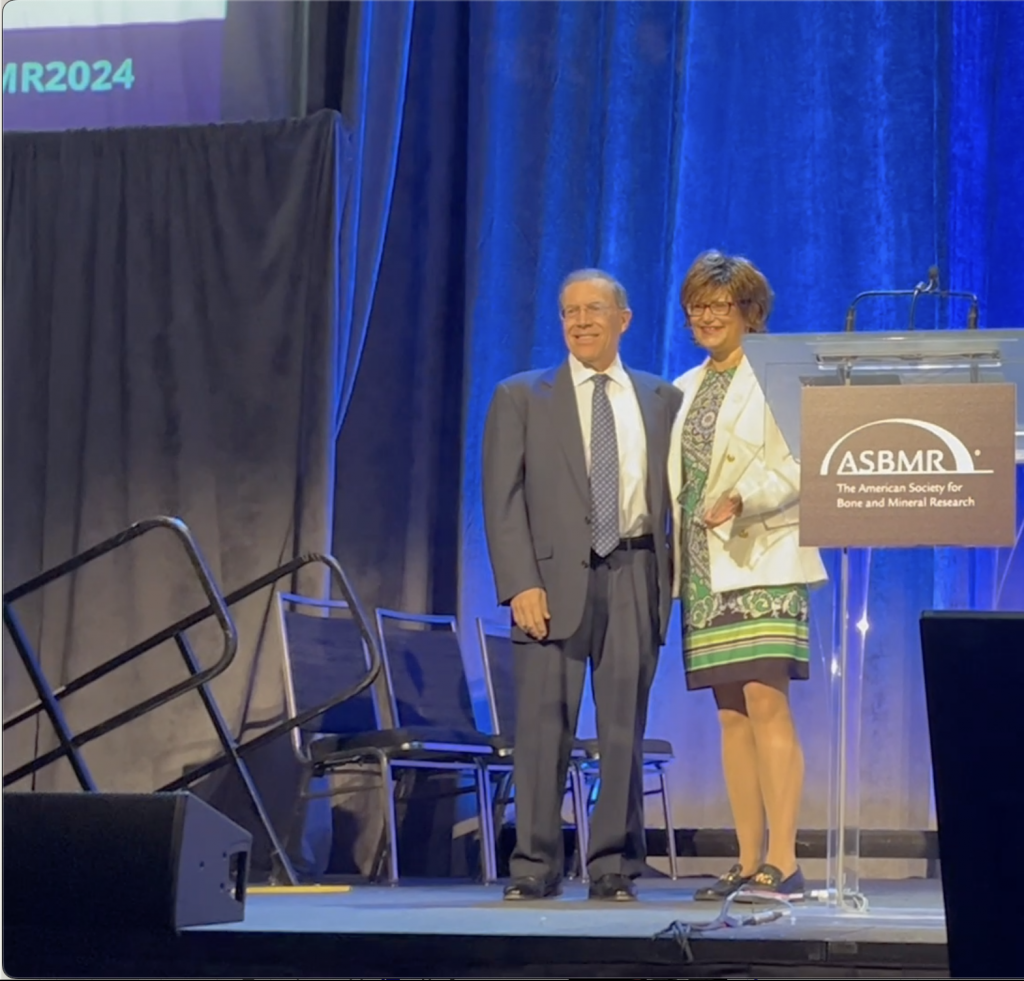UConn’s Dr. Andrew Arnold Awarded Highest Honor of The American Society for Bone and Mineral Research
The William F. Neuman Award, the oldest and most prestigious honor conferred by the ASBMR, recognizes Dr. Andrew Arnold for his outstanding and major scientific contributions in the area of bone and mineral research and for contributions to associates and trainees in teaching, research, and administration.

Arnold accepted the Society’s highest honor during its late September ASBMR 2024 Annual Meeting in Toronto.
Arnold is a pioneer in studying endocrine tumors and hyperparathyroidism. Arnold’s achievements include discovery of cyclin D1, the first known parathyroid oncogene and fundamental cell cycle regulator.
The award is named for William F. Neuman, Ph.D., a world-renowned scientist in the field of mineral metabolism. Neuman’s seminal work on bone-seeking isotopes as part of the Manhattan Project was followed by major works in the chemistry of mineral and matrix, the function of bone cells, the metabolism of parathyroid hormone, and the concept of bone membrane.
Arnold shared, “I would like to express my deepest gratitude to the ASBMR. Receiving the William F. Neuman Award is uniquely meaningful, coming from my academic home society and the organization most familiar with the contributions of our group.”
Arnold currently serves UConn’s medical school as the Murray-Heilig Chair in Molecular Medicine, professor of Medicine and Genetics & Genome Sciences, and chief of the Division of Endocrinology & Metabolism. He is also director of the Center for Molecular Oncology, chief academic officer for the Carole and Ray Neag Comprehensive Cancer Center, and also directs the Office of Physician-Scientist Career Development.
He attended Brown University and Harvard Medical School, trained in internal medicine at University of Chicago followed by fellowships in molecular oncology at NIH and endocrinology at Massachusetts General Hospital. On the faculty of Harvard Medical School and MGH he led the Laboratory of Endocrine Oncology, then moved to UConn School of Medicine.
In addition to the William F. Neuman Award, Arnold’s honors include the ASBMR’s Fuller Albright Award and Louis Avioli Founders Award, the Gerald Aurbach Award of the Endocrine Society, the International Medal of the Society for Endocrinology, and the Outstanding Investigator Award of the American Federation for Medical Research.
“Space prevents me from individually acknowledging most of the wonderful friends, colleagues, collaborators who have profoundly impacted the achievements recognized here, been tremendously supportive, and have made working in our field so enjoyable,” said Arnold. “Certainly among them are Henry Kronenberg, Sundeep Khosla, John Eisman, John Bilezikian, John Potts, Fred Kaplan, Raj Thakker; plus, in memory, Stan Korsmeyer, Larry Raisz and Arthur Broadus. Hank Kronenberg’s role is outsized – my appreciation for his mentorship, scientific insights, and decades-long friendship knows no bounds – I cannot thank him enough. Past and present members of my laboratory group and collaborating investigators, especially Jessica Costa, absolutely share in this recognition, and special thanks and love to my family.”
Latest UConn Today
- Archiving for Justice, Truth, and Memory: Unpacking the Baggage of What Went BeforeReflections on the importance of the newest addition to UConn’s ICTY Digital Archives, the Srebrenica Genocide Archives Collection.
- Multiple Sclerosis Patient Sees Bright FutureFrom unheard to understood
- UConn AUKUS Scholars Explore Undersea Vehicle Technology, International Collaborations in AustraliaFive College of Engineering students studied systems thinking and interdisciplinary teamwork essential in modern undersea vehicle development
- American Academy of Nursing Announces its 2025 Fellows Including Three UConn School of Nursing FacultyMallory Perry-Eaddy, Ph.D., RN, CCRN, Tiffany Kelley, Ph.D., MBA, RN, NI-BC, FNAP, and Gee Su Yang, Ph.D., RN, will be inducted as Fellows into the American Academy of Nursing.
- Finding New Strategies for Treating a Catastrophic DiseaseFoot and Mouth Disease was eradicated in the US in 1929, and researchers are working to make sure it stays that way
- Geothermal Brine May Hold a Key to Stored Energy ChallengesMaking domestic lithium recovery economically and environmentally viable is a critical goal for meeting the nation’s increasing appetite for energy storage and sustainability













